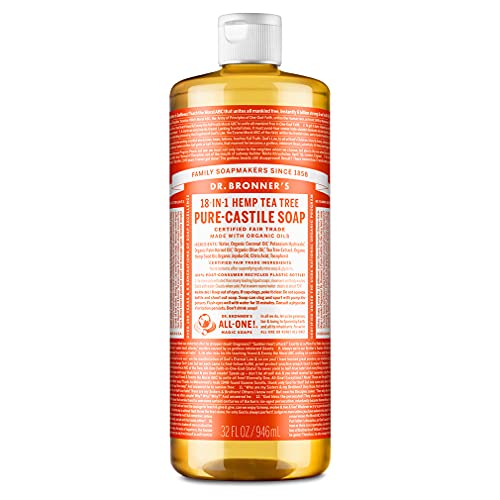
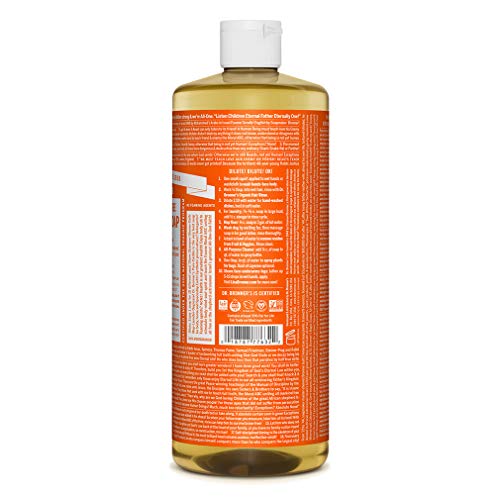
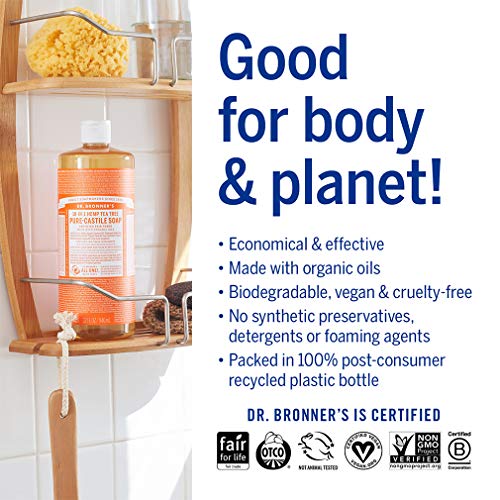
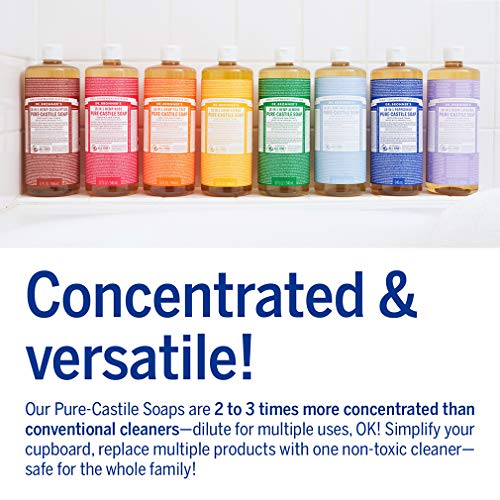
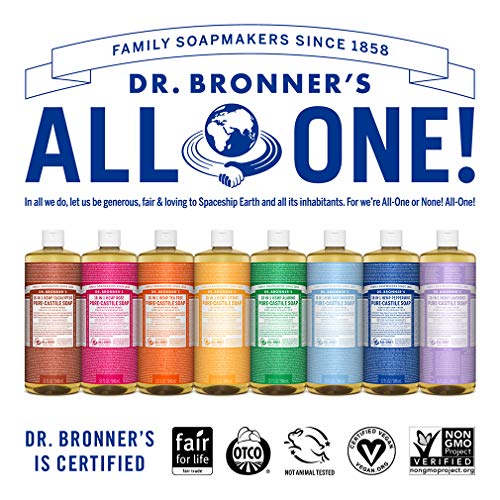
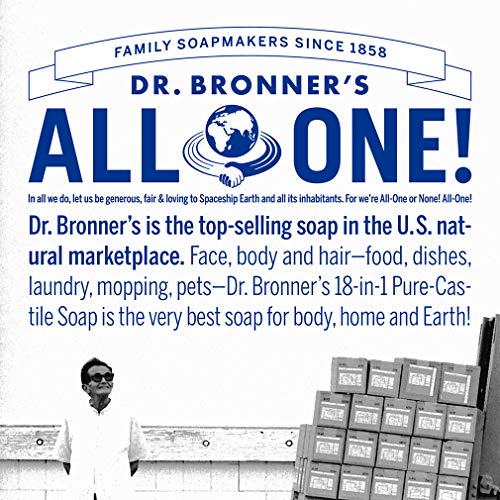

Dr. Bronner's Pure-Castile Liquid Soap - Organic Oils, 18-in-1 Uses, Vegan, 32oz


Potassium Hydroxide
High RiskPotassium hydroxide is a caustic inorganic base commonly used in various products for its ability to adjust pH levels and act as a cleaning agent. It is highly soluble in water and can produce heat upon dissolution, making it effective in certain formulations.
Sustai Insights
Potassium hydroxide serves as a strong pH adjuster and cleaning agent, but it poses significant health risks due to its caustic nature, which can cause irritation to skin and eyes. Environmental concerns include its potential to contribute to water pollution. Regulatory bodies have imposed strict usage restrictions due to these hazards, leading to a high-risk overall assessment. Safe handling practices are essential, and alternatives such as citric acid may provide safer pH adjustment without the associated risks.
Citric Acid
Medium RiskCitric acid is an alpha hydroxy acid used in personal care products primarily for its role as a pH adjuster and natural preservative. It occurs naturally in citrus fruits and is commonly utilized in various formulations for its chelating properties and mild exfoliation benefits.
Sustai Insights
Citric acid offers functional benefits as an effective preservative and pH stabilizer, contributing to product longevity and stability. It is biodegradable and derived from renewable sources. Health risks are low, with minimal concerns regarding carcinogenicity, allergies, and reproductive toxicity. However, moderate use restrictions exist due to potential irritation at high concentrations. Environmental risks are limited, as citric acid is not known to accumulate in ecosystems. Regulatory agencies have no significant advisories against its use. Overall, it is assessed as a medium-risk ingredient, with safe usage practices recommended and alternatives available.
Water
Low RiskWater is a clear, colorless liquid essential for various biological processes. It serves as a solvent in formulations, facilitating the dissolution of other ingredients and enhancing product texture and application. Additionally, water plays a crucial role in hydration and is a key component in many cosmetic and personal care products.
Sustai Insights
Water is an effective solvent and hydrator, contributing to the texture and efficacy of formulations. It is biodegradable and generally regarded as safe, with low concerns regarding carcinogenicity, allergies, and reproductive toxicity. However, excessive water usage can lead to environmental concerns, particularly regarding resource depletion. Regulatory bodies do not impose restrictions on water use in cosmetics. Overall, the risks associated with water are low, making it a safe and essential ingredient.
Simmondsia Chinensis (Jojoba)
Low RiskSimmondsia chinensis, commonly known as jojoba, is an oil derived from the seeds of the jojoba plant. It is commonly used in cosmetic formulations for its moisturizing properties, acting as an emollient and skin conditioning agent.
Sustai Insights
Jojoba oil offers functional benefits such as effective skin moisturization and is biodegradable, with sustainable sourcing practices. Health risks are low, with minimal concerns regarding carcinogenicity, allergies, and reproductive toxicity. Environmental impact is negligible, with no pollutant or bioaccumulation potential. Regulatory status is favorable with no significant restrictions noted. Overall, it is assessed as low risk, and safe usage practices should be maintained. Alternatives include other plant-derived oils like argan or almond oil, which may provide similar benefits.
Melaleuca Alternifolia (Tea Tree) Extract
Low RiskMelaleuca alternifolia (tea tree) extract is derived from the leaves of the tea tree. It is commonly used in cosmetic and personal care products for its antibacterial and antifungal properties, serving as a natural preservative and treatment for skin irritations.
Sustai Insights
Tea tree extract offers functional benefits such as antimicrobial and antifungal effects, contributing to product efficacy in treating skin conditions. It is sustainably sourced and has low environmental impact. Health risks are minimal, with low concerns regarding carcinogenicity, allergies, and reproductive toxicity. Regulatory bodies have not imposed significant restrictions. Overall, the ingredient is assessed as low risk. Safe usage involves patch testing, and alternatives include other plant extracts with similar properties.
Cocos Nucifera (Coconut) Oil
Low RiskCocos Nucifera (Coconut) Oil is derived from the kernels of the coconut palm. It is primarily used in cosmetic formulations for its emollient and moisturizing properties, making it suitable for skin and hair care products.
Sustai Insights
Coconut oil serves as an effective moisturizer and emollient, promoting skin hydration and softness. It is sustainably sourced and biodegradable. Health risks are minimal, with low concerns regarding carcinogenicity, allergens, and reproductive toxicity. Environmental impact is also low, as it does not contribute significantly to pollution or bioaccumulation. Regulatory bodies have not issued restrictions on its use. Overall, coconut oil presents a low risk for health and environmental concerns, making it a safe ingredient in cosmetic products.
Tocopherol, D Alpha
Low RiskTocopherol, specifically d-alpha tocopherol, is a naturally occurring form of Vitamin E. It is commonly used in cosmetic and personal care products primarily for its antioxidant properties, helping to protect formulations from oxidation and extend shelf life.
Sustai Insights
D-alpha tocopherol provides effective antioxidant benefits, contributing to product stability. It is sustainably sourced and generally regarded as safe, with low concerns regarding carcinogenicity, allergies, and reproductive toxicity. However, there are minor concerns about endocrine disruption. Regulatory bodies have not imposed significant restrictions, indicating low overall risk. Recommended usage practices include adhering to established safe concentration thresholds. Alternatives, such as other forms of Vitamin E or plant-based antioxidants, may also be considered.
Water
Low RiskWater is a clear, colorless liquid essential for various biological processes. It serves as a solvent in formulations, facilitating the dissolution of other ingredients and enhancing product texture and application. Additionally, water plays a crucial role in hydration and is a key component in many cosmetic and personal care products.
Sustai Insights
Water is an effective solvent and hydrator, contributing to the texture and efficacy of formulations. It is biodegradable and generally regarded as safe, with low concerns regarding carcinogenicity, allergies, and reproductive toxicity. However, excessive water usage can lead to environmental concerns, particularly regarding resource depletion. Regulatory bodies do not impose restrictions on water use in cosmetics. Overall, the risks associated with water are low, making it a safe and essential ingredient.
Potassium Hydroxide
High RiskPotassium hydroxide is a caustic inorganic base commonly used in various products for its ability to adjust pH levels and act as a cleaning agent. It is highly soluble in water and can produce heat upon dissolution, making it effective in certain formulations.
Sustai Insights
Potassium hydroxide serves as a strong pH adjuster and cleaning agent, but it poses significant health risks due to its caustic nature, which can cause irritation to skin and eyes. Environmental concerns include its potential to contribute to water pollution. Regulatory bodies have imposed strict usage restrictions due to these hazards, leading to a high-risk overall assessment. Safe handling practices are essential, and alternatives such as citric acid may provide safer pH adjustment without the associated risks.
Simmondsia Chinensis (Jojoba)
Low RiskSimmondsia chinensis, commonly known as jojoba, is an oil derived from the seeds of the jojoba plant. It is commonly used in cosmetic formulations for its moisturizing properties, acting as an emollient and skin conditioning agent.
Sustai Insights
Jojoba oil offers functional benefits such as effective skin moisturization and is biodegradable, with sustainable sourcing practices. Health risks are low, with minimal concerns regarding carcinogenicity, allergies, and reproductive toxicity. Environmental impact is negligible, with no pollutant or bioaccumulation potential. Regulatory status is favorable with no significant restrictions noted. Overall, it is assessed as low risk, and safe usage practices should be maintained. Alternatives include other plant-derived oils like argan or almond oil, which may provide similar benefits.
Melaleuca Alternifolia (Tea Tree) Extract
Low RiskMelaleuca alternifolia (tea tree) extract is derived from the leaves of the tea tree. It is commonly used in cosmetic and personal care products for its antibacterial and antifungal properties, serving as a natural preservative and treatment for skin irritations.
Sustai Insights
Tea tree extract offers functional benefits such as antimicrobial and antifungal effects, contributing to product efficacy in treating skin conditions. It is sustainably sourced and has low environmental impact. Health risks are minimal, with low concerns regarding carcinogenicity, allergies, and reproductive toxicity. Regulatory bodies have not imposed significant restrictions. Overall, the ingredient is assessed as low risk. Safe usage involves patch testing, and alternatives include other plant extracts with similar properties.
Cocos Nucifera (Coconut) Oil
Low RiskCocos Nucifera (Coconut) Oil is derived from the kernels of the coconut palm. It is primarily used in cosmetic formulations for its emollient and moisturizing properties, making it suitable for skin and hair care products.
Sustai Insights
Coconut oil serves as an effective moisturizer and emollient, promoting skin hydration and softness. It is sustainably sourced and biodegradable. Health risks are minimal, with low concerns regarding carcinogenicity, allergens, and reproductive toxicity. Environmental impact is also low, as it does not contribute significantly to pollution or bioaccumulation. Regulatory bodies have not issued restrictions on its use. Overall, coconut oil presents a low risk for health and environmental concerns, making it a safe ingredient in cosmetic products.
Citric Acid
Medium RiskCitric acid is an alpha hydroxy acid used in personal care products primarily for its role as a pH adjuster and natural preservative. It occurs naturally in citrus fruits and is commonly utilized in various formulations for its chelating properties and mild exfoliation benefits.
Sustai Insights
Citric acid offers functional benefits as an effective preservative and pH stabilizer, contributing to product longevity and stability. It is biodegradable and derived from renewable sources. Health risks are low, with minimal concerns regarding carcinogenicity, allergies, and reproductive toxicity. However, moderate use restrictions exist due to potential irritation at high concentrations. Environmental risks are limited, as citric acid is not known to accumulate in ecosystems. Regulatory agencies have no significant advisories against its use. Overall, it is assessed as a medium-risk ingredient, with safe usage practices recommended and alternatives available.
Tocopherol, D Alpha
Low RiskTocopherol, specifically d-alpha tocopherol, is a naturally occurring form of Vitamin E. It is commonly used in cosmetic and personal care products primarily for its antioxidant properties, helping to protect formulations from oxidation and extend shelf life.
Sustai Insights
D-alpha tocopherol provides effective antioxidant benefits, contributing to product stability. It is sustainably sourced and generally regarded as safe, with low concerns regarding carcinogenicity, allergies, and reproductive toxicity. However, there are minor concerns about endocrine disruption. Regulatory bodies have not imposed significant restrictions, indicating low overall risk. Recommended usage practices include adhering to established safe concentration thresholds. Alternatives, such as other forms of Vitamin E or plant-based antioxidants, may also be considered.
Experience the purity of Dr. Bronner's Pure-Castile Liquid Soap in Tea Tree scent. Crafted with over 70% organic and certified fair trade ingredients, this versatile soap supports ethical practices while providing exceptional care for your skin and the environment.
- Organic & Fair Trade Ingredients: Made with sustainably sourced oils, promoting healthy communities while delivering a creamy lather that’s gentle on the skin.
- Non-Toxic Formula: Free from synthetic preservatives and foaming agents, ensuring a safe and natural wash for both skin and planet.
- Multi-Purpose Use: 18-in-1 uses including body wash, laundry, and pet care make this soap a cost-effective solution for all your cleaning needs.
- Eco-Friendly Packaging: Packaged in 100% post-consumer recycled plastic, helping to reduce plastic waste and promote sustainability.
- Concentrated Value: Three times more concentrated than standard liquid soaps, allowing for dilution and reducing packaging waste—more soap means less impact on the environment.
Subscribe & Save with Sustai
- Best Price Guarantee: Always enjoy the lowest prices on sustainable home essentials.
- No Surprises: We’ll notify you before shipping. No hidden fees, ever.
- You’re in Charge: Change, pause, or cancel your subscription anytime with ease.
- Eco-Friendly Deliveries: Our grouped shipments mean less packaging and lower emissions.
Join us on a sustainable journey. Special offers for a limited time! Prices and promotions may change.
Recommended Products
Experience the purity of Dr. Bronner's Pure-Castile Liquid Soap in Tea Tree scent. Crafted with over 70% organic and certified fair trade ingredients, this versatile soap supports ethical practices while providing exceptional care for your skin and the environment.
- Organic & Fair Trade Ingredients: Made with sustainably sourced oils, promoting healthy communities while delivering a creamy lather that’s gentle on the skin.
- Non-Toxic Formula: Free from synthetic preservatives and foaming agents, ensuring a safe and natural wash for both skin and planet.
- Multi-Purpose Use: 18-in-1 uses including body wash, laundry, and pet care make this soap a cost-effective solution for all your cleaning needs.
- Eco-Friendly Packaging: Packaged in 100% post-consumer recycled plastic, helping to reduce plastic waste and promote sustainability.
- Concentrated Value: Three times more concentrated than standard liquid soaps, allowing for dilution and reducing packaging waste—more soap means less impact on the environment.

You can have at most 2 Sustainable Steals products in your cart
Customer Reviews
Customers’ View
Customers appreciate the effectiveness and eco-friendly nature of Dr. Bronner's Pure-Castile Liquid Soap, noting its gentle cleansing properties that are particularly beneficial for sensitive and acne-prone skin. Many users highlight the soap's versatility, praising its ability to serve as a natural cleaner for various household tasks and its use as a soothing foot soak. Positive sentiments frequently mention the product's organic and fair trade ingredients, with customers expressing satisfaction over its value for money given its concentrated formula. However, opinions on the tea tree scent are mixed, with some finding it strong. Overall, this soap is recognized for its alignment with sustainable practices and health-conscious values, making it a trusted option for environmentally aware consumers.
AI-generated from the text of customer reviewsThis product is rated 4.9 of 5.0 stars.
It has received 26 reviews.




